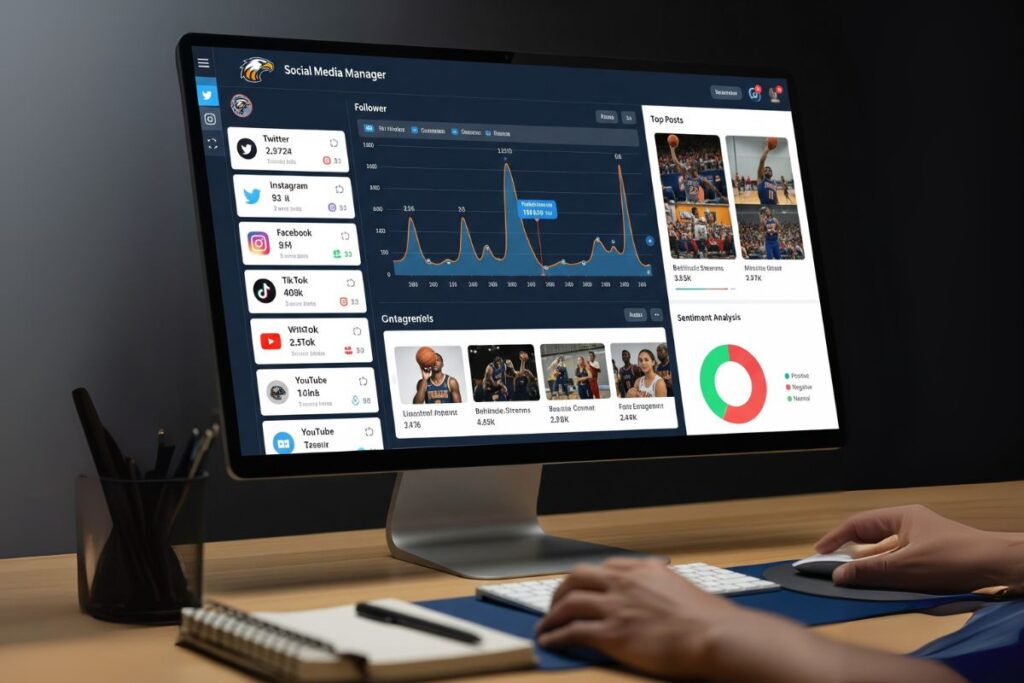You live and breathe sports. You know the stats, you follow the teams, and you feel the electric buzz of a last-minute victory. But what if you could turn that passion into your profession? A career in sports management is your ticket to the heart of the action, working behind the scenes to make the magic happen.
But here’s the reality check: passion alone won’t land you the job. The global sports market is projected to reach over $600 billion in the coming years Statista report on the global sports market, and it’s a fiercely competitive industry. To succeed, you need a specific, powerful toolkit of skills that separates the fans from the front-office professionals.
So, what does it truly take to build a successful career in sports management? It’s about combining a love for the game with sharp business acumen, exceptional people skills, and specialized industry knowledge. This guide will break down the essential skills you need to cultivate to not just enter the field, but to become an indispensable leader within it.

Why a Career in Sports Management is More Than Just Loving the Game
Many people think a sports manager’s job is all about scouting talent or celebrating championship wins. While those can be perks, the day-to-day reality is far more complex and strategic.
A sports manager is a business leader, a negotiator, a marketer, and a logistician all rolled into one. You could be managing a multi-million dollar stadium budget, negotiating a groundbreaking sponsorship deal, launching a digital marketing campaign to engage fans, or ensuring a major international tournament runs without a hitch.
This dynamic field requires professionals who can think critically, lead effectively, and understand the intricate business ecosystem that underpins every sport. Your passion is the fuel, but the skills are the engine that will drive your career forward.
Foundational Business Skills for Sports Managers
At its core, the sports industry is a massive business. To manage any part of it effectively, you need a rock-solid foundation in core business principles.
Financial Acumen & Budgeting
Money is the lifeblood of any sports organization. Whether it’s a professional team, a university athletic department, or a sports marketing agency, understanding finance is non-negotiable.
What this looks like in action:
- Team Finances: Managing player salaries and navigating complex salary caps.
- Facility Management: Creating and overseeing budgets for stadium operations, maintenance, and upgrades.
- Revenue Streams: Analyzing ticket sales, merchandise revenue, and broadcasting rights to maximize profitability.
- Financial Reporting: Preparing detailed financial reports for stakeholders and team owners.
You must be comfortable with spreadsheets, financial modeling, and making high-stakes decisions based on data.
Marketing, Sponsorship, and Sales
No sports organization can survive without a fanbase or funding. This is where marketing and sales skills come in. You need to know how to sell tickets, attract viewers, and, most importantly, secure lucrative sponsorship deals.
Key responsibilities include:
- Developing marketing campaigns to increase ticket sales and fan engagement.
- Identifying and pitching potential corporate sponsors.
- Crafting activation strategies that provide real value to sponsors.
- Managing brand partnerships to ensure they align with the team’s image and values.
This skill is about understanding what motivates fans and brands, then creating compelling narratives that bring them together.
Strategic Planning and Analytics
The days of making decisions based on “gut feelings” are over. Today’s sports industry is driven by data. A successful career in sports management hinges on your ability to analyze information and develop long-term strategies.
This involves:
- Data Analysis: Using analytics to understand fan behavior, player performance, and market trends.
- Strategic Growth: Developing multi-year business plans for a team or league.
- Competitive Analysis: Studying what other organizations are doing successfully (and unsuccessfully) to gain a competitive edge.
- Risk Management: Identifying potential challenges—from financial downturns to public relations crises—and creating contingency plans.

Essential Leadership and People Skills
Sports is, and always will be, about people. From athletes and coaches to fans and media, your ability to communicate, lead, and negotiate will define your success.
Communication and Public Relations
You will be the voice of your organization. Whether you’re speaking to the media after a tough loss, presenting a new initiative to stakeholders, or communicating with fans on social media, your words matter.
Essential communication skills include:
- Public Speaking: Clearly and confidently addressing groups of all sizes.
- Media Relations: Building relationships with journalists and managing press conferences.
- Crisis Communication: Handling sensitive issues calmly and professionally to protect the organization’s reputation.
- Written Communication: Crafting professional emails, press releases, and internal memos.
Negotiation and Conflict Resolution
A huge part of a sports manager’s job involves high-stakes negotiations. This could be anything from a player’s contract to a multi-year broadcasting deal. You need to be able to find common ground and secure the best possible outcome for your organization.
Equally important is conflict resolution. Tensions can run high in a competitive environment, and it’s your job to mediate disputes between players, coaches, or staff to maintain a positive and productive atmosphere.
Team Leadership and Motivation
Whether you’re managing a small marketing team or an entire athletic department, leadership is crucial. You need to be able to inspire your staff, set clear goals, and create a culture of excellence. Great leaders in sports management empower their teams to do their best work, fostering collaboration and celebrating shared successes.
Specialized Knowledge for the Sports Industry
Beyond general business and leadership skills, a top-tier sports manager needs expertise in areas unique to the world of sports.
Learn more about different jobs in sports management
Sports Law and Ethics
The sports world is governed by a complex web of rules and regulations. A basic understanding of contract law, liability, intellectual property, and player representation is essential. You don’t need to be a lawyer, but you need to know enough to spot potential legal issues and when to seek expert advice. Upholding ethical standards is equally important for maintaining the integrity of the sport and your organization.
Event Management and Logistics
Pulling off a successful sporting event is a monumental task. It requires meticulous planning and flawless execution.
Key logistical areas include:
- Venue Coordination: Managing everything from security and ticketing to concessions and transportation.
- Scheduling: Creating and managing complex game and tournament schedules.
- Vendor Management: Coordinating with dozens of vendors for services like broadcasting, medical support, and hospitality.
- Fan Experience: Ensuring every aspect of the event, from parking to halftime shows, is enjoyable for attendees.
Digital Media and Fan Engagement
Modern sports fandom happens 24/7 on digital platforms. Teams and leagues that excel at digital engagement build deeper, more loyal fanbases. You need to be proficient in social media strategy, content creation, and using digital tools to connect with fans on a personal level. This could involve creating behind-the-scenes content, running interactive polls, or managing online communities.

How to Develop These Skills for Your Sports Management Career
Reading about these skills is one thing; acquiring them is another. Building a successful career in sports management requires a combination of formal education, hands-on experience, and relentless networking.
- Formal Education: A specialized degree program can provide the structured knowledge and credentials you need. Look for programs that focus on the business of sports.
- Gain Experience: Volunteer or intern with a local sports team, university athletic department, or sports-related non-profit. No task is too small when you’re starting out.
- Find a Mentor: Connect with professionals who are already in the field. Their guidance and insights can be invaluable.
- Stay Informed: The sports industry is constantly evolving. Read industry publications like the Sports Business Journal, listen to podcasts, and stay up-to-date on the latest trends.
Start Your Journey with the Institute of Sports Science & Technology
Feeling overwhelmed? Don’t be. The path to your dream career in sports management is clearer than you think, and it starts with the right foundation.
This is where the Institute of Sports Science & Technology (ISST) comes in. We understand that passion for sports needs to be molded with professional expertise. Our curriculum is specifically designed to build the exact skills we’ve outlined in this guide.
At ISST, you won’t just learn theory from a textbook. You’ll dive deep into practical case studies, learn from industry veterans, and gain hands-on experience that prepares you for the real world. Our programs in Sports Management are crafted to give you a competitive edge, focusing on:
- Business of Sports: Master financial management, sports marketing, and sponsorship.
- Leadership Development: Hone your communication, negotiation, and team management abilities.
- Industry-Specific Knowledge: Gain a deep understanding of sports law, event logistics, and digital fan engagement.
We don’t just teach sports management; we connect you to it. Our extensive network and focus on practical application mean our graduates are prepared to hit the ground running and make an immediate impact.
Ready to Turn Your Passion into a Profession?
You have the drive. You have the passion. Now, it’s time to get the skills. Stop dreaming about a career in sports management and start building one.
Explore our specialized Sports Management courses at the Institute of Sports Science & Technology today. Download our prospectus to see how we can help you land your dream job in the sports industry!




